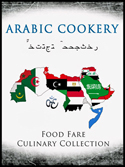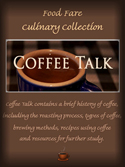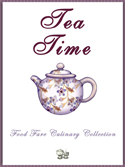|
Special Edition: Arabic Cookery January 2014 Volume 14, Issue #1
(Algerian beef-layered mashed potatoes)
Mash potatoes with butter and salt. Heat olive oil in large skillet; add onion, ground beef and black pepper. Sauté for about five minutes. Butter a one-quart casserole dish. Place half the potatoes on the bottom of dish. Add meat and cover with remaining potatoes. Smooth the surface with a table knife. Top with beaten egg and sprinkle with cheese. Bake at 350-degree F for about thirty minutes or until surface is golden in color. Serve.
(Bahraini Bread Pudding)
Preheat oven to 400-degrees F. Unroll puff pastry; place on greased baking sheets. Bake for about fifteen minutes, or until the pastry is puffed and golden in color. Remove from oven. Break puff pastry into small pieces. Add nuts and coconut; mix well to evenly distribute. Place the nuts and bread in a greased baking dish (9x12). In a saucepan, warm sweetened milk, vanilla and water over medium heat. Allow to cook for about three to five minutes. Remove from heat; allow to cool. Pour milk over puff pastry/nut mixture. Pour cream on top. Bake uncovered for about fifteen minutes. Serve warm.
Food Fare receives e-mail from reader's who have something to say about our web site, recipes, cookbooks, food articles and e-books in the Culinary Collection.
|
Arabic Cookery is the latest release in Food Fare's Culinary Collection. Countries represented in Arabic Cookery include member nations of the Arab League among a few others: Algeria, Bahrain, Chad, Comoros, Cyprus, Djibouti, Egypt, Eritrea, Iran, Iraq, Jordan, Kuwait, Lebanon, Libya, Mauritania, Morocco, Oman, Qatar, Saudi Arabia, Somalia, Sudan, Syria, Tunisia, United Arab Emirates (UAE) and Yemen. The collection of recipes consists of well-known regional favorites, as well as tips for finding uncommon ingredients. Brief histories and statistics for each country are also included.
While many mealtime dishes appear to be similar in Middle Eastern cuisine, there are uniquely distinct flavors to be found in the different countries, regions, cities and villages. The collective cultures are rich with fascinating histories, traditions and culinary offerings, along with unrelenting civil, political and religious strife. However, Arabic Cookery is not meant to be a historical narrative but rather an enjoyable bit about general Middle Eastern culture and their delicious food. The book took nearly one year to put together, with extensive recipe assembly, photography and seemingly endless weeks and months of research via online resources, e-books and print books.
Arabic Cookery was written for entertainment purposes and expresses the sole opinions of the author. Arabic Cookery is not meant to be a professional chef's essay about Middle Eastern cuisine, but rather an observation about the generalities of Middle Eastern food and recipes from a home kitchen.
Devout followers of Islam observe "Principles of Jurisprudence" (Usul al-fiqh) in regards to actions or objects which are acceptable to engage in. Under Islamic Shari'ah, Muslims are only allowed to consume permissible (halal) foods.
Islamic Dietary Laws prohibit the consumption of alcohol and pork, with specific rules applied to the slaughter of animals. Unlawful food and drink (haram) includes dead meat (carcass of an animal found already dead), blood, flesh of swine (pork), intoxicating drinks, birds of prey (falcons, owls, vultures), carnivores (lions, tigers, wolves), animal meat sacrificed to idols, animals who died from strangulation or blunt force, and carrion that wild animals have partially eaten. An exception is made if no other food is available, when Muslims are allowed to eat haram edibles: "If one is forced because there is no other choice, neither craving nor transgressing, there is no sin on him." (Surah 2:173).
Muslims slaughter livestock by slitting an animal's throat with a sharp knife in a quick - and therefore felt to be merciful – manner, known as Qurbani. God's name (Allah) is recited during the process, the uttering of which might include "In the name of God, the Most Gracious, the Most Merciful" (Bismillah). The slaughter ritual (Dhabihah) is meant to acknowledge life as sacred, and that killing animals is only carried out to meet the need for food. Animals are bled before consumption. Meat prepared by the ritual is also known as zabihah or halal meat.
Alcohol or general intoxicants (al-khamr or sukara) are forbidden in the religious text of the Quran: "Intoxicants and games of chance are abominations of Satan's handiwork."
The prophet Muhammad even forbade the intake of alcohol in small amounts, certain it made those under the influence forgetful of God and prayer. Through history to the present day, prohibited substances have come to include illegal drugs sold on the street as well. Text excerpt from Arabic Cookery (c)2014 Food Fare; reprinted with permission.
Meals in Middle Eastern countries are often taken in communal fashion, with people choosing food from a large plate in the center of a table. Instead of using utensils, pita bread is frequently used to scoop food for consumption. People also employ their fingers to eat, although the right hand is always used rather than the left as the left-hand is considered unclean in Arab culture. However, the left-hand may be used to hold a drinking glass when greasy food is offered. It is the height of bad manners not to try every dish offered, and the host must always be complimented on their hospitality.
Apart from the month of Ramadan, typical mealtimes include breakfast (breads such as croissants or pita taken with strong coffee or tea, falafel, hummus, knafeh, lablabi and olives), lunch (main meal of the day, often eaten after the noon prayer, might consist of appetizers, breads, meats, poultry, rice, salads and vegetables) and dinner (lightest meal of the day usually served in early evening, which might include grains, fish, meats and vegetables). During Ramadan (ninth month of the Islamic calendar when Muslims observe fasting or sawm from dawn to sunset), meals consist of Sahur (taken just before dawn) and Futuur (fast-breaking at dusk). Sahur meals might include baklava, basbousa, fresh fruits and the creamy nut-filled dumpling known as Qatayef. Futuur dishes typically consist of a three-course meal with an array of breads, dates, meats and soups.
Other common mealtime foods in many Arabic countries include beverages (coffee, fruit juices, jallab, tea), bread (lavash, naan and pita flatbreads are typical), dairy (butter, cheese, cream, yogurt), fruits and nuts (almonds, apples, apricots, dates, figs, lemons, mango, olives, oranges, peanuts, pine nuts, pistachios, pomegranates and walnuts), grains (bulgur, cereals, cracked wheat, freekeh, rice, semolina), legumes (chickpeas, fava beans, lentils), meat (beef, chicken, goat, lamb, mutton and veal), oil (primarily olive and sesame oils), herbs, spices and other flavorings (the most common including allspice, anise seeds, baharat, black pepper, caraway, cardamom, cinnamon, cloves, cumin, garlic, mint, nutmeg, saffron, sesame, sumac, thyme, turmeric and za'atar), vegetables (beets, cabbage, carrots, cauliflower, chard, cucumbers, eggplant, green beans, okra, onions, peas, spinach, squash, tomatoes, turnips and zucchini), and Mezze (appetizers and side dishes such as baba ghannouj, hummus, olives, pickles, sambusak and tabouleh salad).
Camel milk is also part of Arabic cuisine, particularly in Mauritania, Saudi Arabia and the United Arab Emirates (UAE). Mauritania produces cheese using camel milk, which is known as Caravane. It is a soft and creamy cheese with a white crust.
The earliest known Arabic cookbook appeared in 1266. Al-Kitab Al-Tabih (Book of Dishes) was written by Baghdadi native Ibn Sayyar al-Warraq. Manuscripts of the original cookbook still exist in Turkey. Text excerpt from Arabic Cookery (c)2014 Food Fare; reprinted with permission.
Ramadan is a month of fasting in the Islamic calendar, usually falling in mid-summer or when the crescent moon is sighted. Muslims fast from dawn until sunset, which also includes abstaining from sexual relations, smoking and in some cases, using profanity.
Traditional foods eaten at sufoor (dawn) and after iftar (sunset) are light meals containing breads and grains, low-fat dairy products, fruits, halal meats, legumes and fresh vegetables. Dates usually break the fast at sunset, after which can follow appetizers, desserts, entrees, juice, salads and water. Some of the typical foods consist of chicken or lamb with rice and vegetables, along with sticky pastries and nuts.
Common Ramadan meals include Aleecha (mild vegetable stew), Bamia (meat and okra stew), Basbousa (nut cakes), Chabbakia (fried dough coated in honey and sesame seeds), Chorba (lamb stew with chickpeas and tomatoes), Fasulia (meat stew with green beans), Fattoush (vegetable salad with pita bread), Ful Mudammas (mashed fava beans served on flatbread), Hindbeh (Ramadan dandelion flowers), Khyar Bi Laban (cucumber and yogurt salad), Kleicha (date cookies), Konafa (pastry in Atar syrup), Mujadarra (lentils and rice), Qamar Eddine (apricot juice), Qatayef (pancakes filled with cheese and nuts), Sakhana (wheat soup flavored with dates, milk and molasses), Sambuusa (savory pastries), Tabouleh (bulgur wheat salad with parsley and tomatoes), Tamar Mahshi (almond-stuffed dates), Tharid (lamb with vegetables) and Umm Ali (bread pudding), among many others. Text excerpt from Arabic Cookery (c)2014 Food Fare; reprinted with permission.
We're working on our next Culinary Collection installment, scheduled for release sometime this summer. Keep your eyes peeled...
Check for updates on our News page and Appetizing Muse, or visit us at Facebook, Google+, Pinterest and Twitter.
Happy Cooking from Food Fare,
|
Shenanchie O'Toole Chief Editor, Food Notes
Connect with Shenanchie: Appetizing Muse (blog)
(Djiboutian flatbread)
In a bowl, mix together flours and yeast. Add enough lukewarm water to produce a pourable batter. Cover bowl with a damp cloth; set aside in a warm place overnight to allow fermentation. Next day, stir batter and add salt to taste. Heat a small amount of vegetable oil in a large skillet. Pour a small amount of batter into skillet; swirl batter around to coat the bottom (similar to cooking pancakes). Cook until set, about one or two minutes. Serve.
(Egyptian nutty herb dip)
Spread pistachio nuts and almonds in a single layer on a cookie sheet; toast in a hot oven for about fifteen minutes, stirring frequently to prevent burning. Toast seeds in the same manner. Cool nuts and seeds; combine with remaining ingredients in a food processor. Process mixture to resemble small breadcrumbs; the result should be dry and crumbly, not a paste. Suggestion: Serve with flatbread.
(Libyan lamb & tomato soup)
Heat olive oil in a skillet over medium heat; add chopped onion and sauté for two or three minutes, or until soft. Add chopped lamb, chickpeas, tomato paste, spices and salt; cook for a few minutes more, stirring occasionally. Cover the mixture with water (about four cups) and simmer over medium heat for thirty to forty-five minutes, or until the lamb is fully cooked. Add more water if necessary. Near the end of cooking time, stir in dried mint or chopped parsley and lemon juice. Serve.
|












